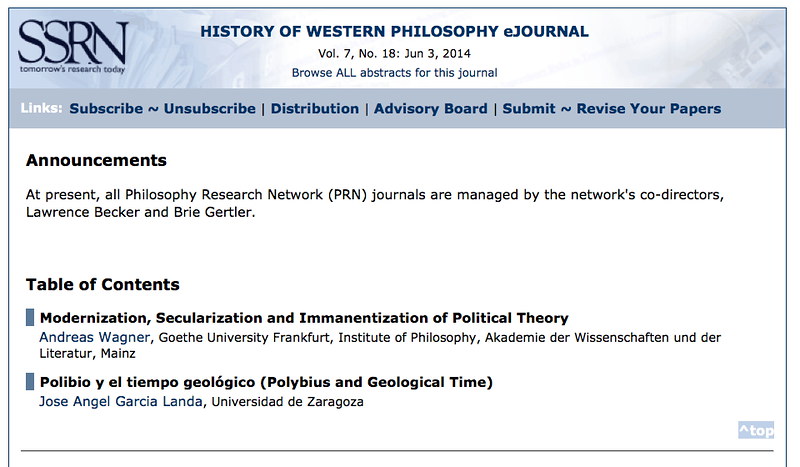Polibio y el tiempo geológico
//
Este artículo que publico en el SSRN comenta un pasaje de las Historias (libro IV) en el que Polibio reflexiona sobre los cambios geológicos y sobre la transformación de los paisajes, proponiendo un método mediante el cual se podrían medir estos procesos extremadamente lentos. Estas reflexiones suponen un precedente clásico de las teorías gradualistas sobre el tiempo geológico asociadas a autores como Hutton y Lyell, fundadores de la geología moderna. El acercamiento al estudio del tiempo geológico mediante un método científico, propuesto por primera vez en la modernidad temprana (s. XVII) por Edmond Halley, encuentra así un antecesor clásico, aunque ciertamente algo aislado.
Polybius and Geological Time
Abstract: This paper comments a passage of the Histories (book IV) in which Polybius reflects on geological change and the transformation of landscapes, and suggests a method whereby extremely slow processes could be measured. These reflections provide a classical precedent for the gradualist approach to geology of deep time associated to such authors as Hutton and Lyell, the founders of modern geology. The approach to the study of deep geological time using a scientific method first propounded in the early modernity by Edmond Halley in the 17th century has thus a (rather isolated) classical forerunner.
http://papers.ssrn.com/abstract=2442688
Aparece, o aparecerá próximamente, en las siguientes revistas temáticas / To be found in the following e-Journals (Date posted: May 28, 2014):
| eJournal Classifications | Message |
AARN Subject Matter eJournals  | Added to eLibrary |
AARN Subject Matter eJournals  | Added to eLibrary |
CRN Subject Matter eJournals  | Scheduled in Ancient Philosophical & Scientific Texts eJournal October 02, 2009 (?) |
PRN Subject Matter eJournals   | Scheduled in History of Western Philosophy eJournal June 03, 2014 |
PRN Subject Matter eJournals  | Scheduled in Philosophy of Science eJournal June 02, 2014 |

Y asimismo en mis repositorios— en Academia: https://www.academia.edu/10372866/
y en ResearchGate: https://www.researchgate.net/publication/271515661

0 comentarios